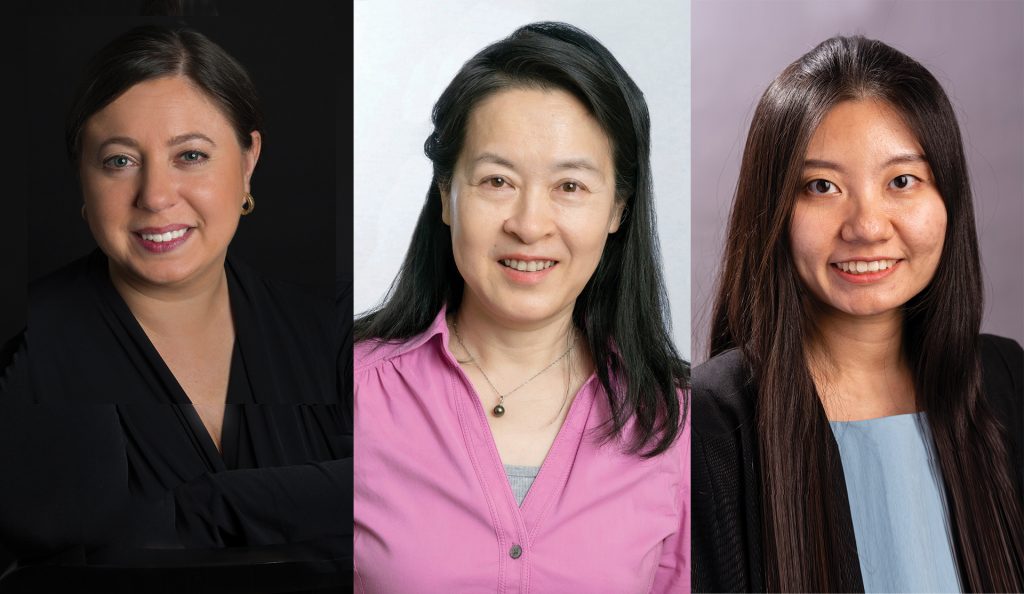School of Nursing Faculty Lead Funded Research on Aging and Dementias

If you’re not yet over 65, you may well be caring for someone who is. Over the last decade, the umber of Americans 65 and older jumped from 39.6 million to 54.1 million, and it’s expected to reach 80.8 million by 2040. The predicted increase in Americans suffering from Alzheimer’s disease is equally dramatic, projected to grow from 6 million to 15 million by 2060.
All these numbers add up to a critical need for research into aging, particularly as it points the way toward achieving a healthier old age and a more peaceful end-of-life experience.
Recently, three faculty researchers at Rutgers School of Nursing received grants—from the National Institutes of Health and the Alzheimer’s Association—supporting research on Alzheimer’s disease and related dementias. All three aim to improve the health and well-being of older adults and their caregivers.
An Underutilized Insurance Benefit that Could Improve Late-Life Care Outcomes
Both restorative and palliative care—support for patients with serious, sometimes terminal, illnesses—delivered at home, can make a tremendous difference in quality of life, especially if that care is provided by skilled home health care professionals. Unfortunately, home health care and home hospice are underutilized among racial and ethnic minority populations, despite coverage by Medicare and Medicaid.
With a four-year, $2.6 million grant (RO1AG066139) from the National Institutes of Health’s National Institute on Aging (NIH/NIA), a team led by Olga F. Jarrín Montaner (PhD, RN), assistant professor, has begun to investigate the ways in which skilled home health care can benefit those with Alzheimer’s disease and other dementias.
When employed years before a patient’s final decline in health, this kind of care, says Jarrín, “can help overcome structural and systemic racism, which contributes to lower utilization of palliative and hospice care among the rapidly growing population of Black, Hispanic, and Asian older adults living with advanced dementia.”

Building the Research Infrastructure to Answer Questions About Healthy Aging
What factors contribute to healthy aging among people living with dementia? That’s the big question that School of Nursing Professor Haiqun Lin (PhD, MD); Olga Jarrín; and their interprofessional research team hope to answer through the creation of a unique, comprehensive research repository and a suite of analytic methods to study the trajectories of health and illness experienced by Medicare beneficiaries during the last five years of life.
Thanks to a three-year, $2.3 million, NIH/NIA grant (R33AG068931), Lin, a professor of biostatistics, and Jarrín, will incorporate data on individual factors affecting health, including chronic conditions like heart disease and acute illnesses such as COVID-19, as well as potential environmental, political, and socioeconomic determinants like the stresses of poverty and exposure to air pollution.
In addition to examining data, researchers will use predictive modeling and machine learning to determine which patients, based on a wide variety of risk factors, are more likely to enjoy a relatively independent living experience toward the last years of life, accompanied by a low expenditure on health care. “That approach,” says Lin, “is very new and should be very effective.”
How Family Affects Function
Supported by a $147,195 grant from the Alzheimer’s Association, Mengting Li (PhD), assistant professor, is looking into ways in which the family environment might affect cognitive function in older adults. Analyzing data collected from a large study of Chinese older adults in the Chicago area, Li and her colleagues have sorted some 3,000 individuals into four family types: tight knit (close, with minimal conflict), ambivalent (close, with high conflict), conflicted (not close, with high conflict), and detached (not close, with low conflict).
Since it was launched in mid-2020, the study has already yielded the surprising finding that cognitive function appears to be highest among older adults in ambivalent families, perhaps, says Li, “because a stressful relationship, buffered by close family ties, might cause older adults to think about how to solve their conflicts.” She expects that the final two years of the three-year study will yield a firm explanation, along with other important insights.
Her research could ultimately lead to family-based strategies that would delay or prevent Alzheimer’s and other dementias. “As life expectancy increases,” she says, “the time spent between parents and children will also increase, making intergenerational relationships especially important.”
